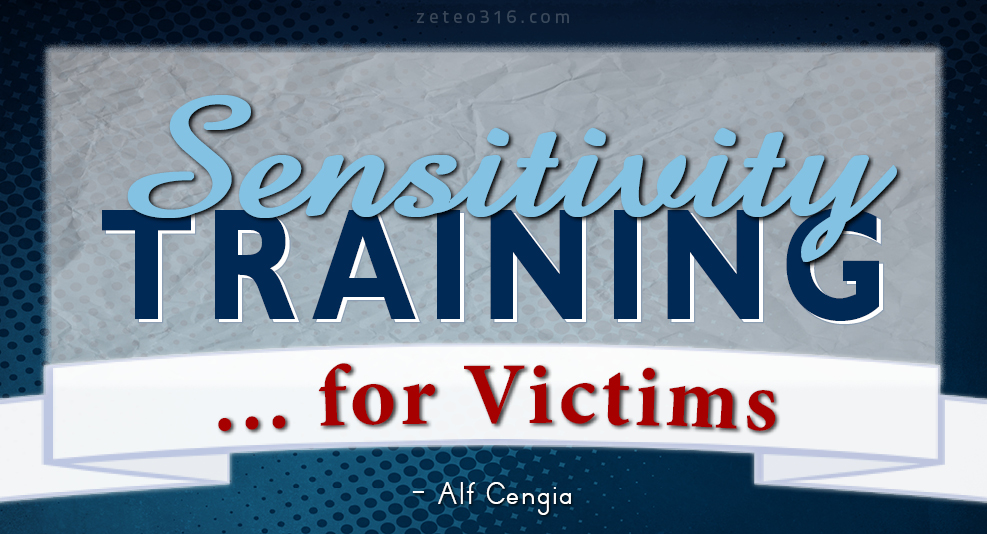Maybe we should start thinking about sensitivity training for victims. I’m toying with the idea that if victims of violence become more sensitive to its causes, we might reduce some of these incidents.
Have I got your attention? First it’s time for another one of those personal anecdotes…
When my parents migrated to Australia, they enrolled me into St. Brigid’s Primary School along with a host of other migrant kids. It was daunting for most of us because we’d been dumped into a strange school where a language was spoken which we didn’t understand. A lot of us cried on our first day.
Most of the Australian kids were friendly – except for one. For some reason, John beat up on the migrant kids. I forgot how many times I went home bruised without defending myself.
My mother raised me to believe that fighting was sinful. So, apart from being afraid, I was also morally opposed to fighting back. After a few bashings she spoke to his parents. John subsequently stopped beating up on me. Other Italian kids kept getting the treatment.
My father took matters into his own hands. One night he stuck a pillow on a clothes line and had me punch it. The “lesson” didn’t make me a better fighter but it gave me a boost in confidence.
When John beat up my friend, I challenged him. Somehow my fist accidentally bounced off his nose and he had to be escorted home. He never again beat up on my friends. There was a general respect for authority back then. Rules were clearly defined and so were the consequences. Life was simple – we fought and we then made up.
But was there a better way to resolve the issue? John’s parents came from Scotland and he was proud of his heritage. He resented the fact that the neighborhood was being overrun by people from a non-British country which had once sided with Hitler.
Going by today’s victimhood logic, he might have been seen as the victim. The migrant kids should have somehow been sympathetic to his feelings of insecurity when he played out his violence. Unfortunately there was no sensitivity training back then.
Of course this makes as much sense as asking an abused wife whether she has in some way provoked her husband. Or that the woman who was raped shouldn’t have led her attacker on.
But that’s the sort of insane logic some used in looking for excuses for the San Bernardino shooting murders. It’s a modern flip-flop of my experience where a migrant resorts to violence, yet emerges a victim.
One CNN reporter actually asked the widow whether her husband had provoked the shooter. How do you provoke someone to shoot you? Did the shooters act in fear for their lives?
Journalist Linda Stasi also had some ideas which involved blaming at least one victim. She listed a set of grievances against the Messianic Jew who was killed by the couple. She claimed he was a bigot because of some of his social media comments.
It didn’t help that he was “obsessed with Israel” and didn’t like Democrats. I assume he would also have benefitted from sensitivity training and, consequently, avoided being murdered. Of the shooter and his victim, Stasi wrote:
“They were two hate-filled, bigoted municipal employees interacting in one department. Now 13 innocent people are dead in unspeakable carnage…”
Fourteen people were murdered that day. Stasi must assume the other 13 victims agreed with her ideology and didn’t deserve to be killed. If someone attacks her for her views, might she then also consider sensitivity training?
Don’t bet on it. Western society has embraced a set of untouchable Sacred Cows which are taboo to criticize. Think Planned Parenthood, Islam etc. If you’re not on board you’re a bigot.
In reality, we now know the shootings would have occurred despite the shooters’ work interaction. They were radicalized terrorists who planned to kill infidels. We also know that the gun debate is a red herring. Terrorists don’t need guns. They can use planes, or knives and cars – as we’ve seen recently in Israel.
Or they can plan to turn fertilizer into bombs, as was the case of the twelve young Muslims arrested in Melbourne in 2008. Notably, many in the Muslim community attempted to defend these men by suggesting that they were victims of prejudice.
Despite apologetic lectures from Mr. Obama, Loretta Lynch and others, these people aren’t victims of the society which embraces them. They are victims of fundamentalist Islam and man’s sinful nature.
I get frustrated by people who want to shift the blame away from the obvious by commandeering the narrative. I am troubled that Christianity is no longer openly welcomed while Islam appears to be. In reality this is the normal condition. The world has always rebelled against God.
It’s annoying that Christmas is just about upon us and we’re already seeing the atheist attacks. I guess they’re easily offended by all things Christian, and I should be more sensitive.
But the only real sensitivity training for victims I need is to constantly remind myself that the unsaved are faced with eternal torment in hell. In that sense, they are the real victims. This is their world, of which I’m not really a citizen (Phil 3:20-21).
Furthermore, how I privately and publicly react to these temporal frustrations will directly impact the effectiveness of any effort to witness on my part.
And that’s one thing the devil counts on.
For our battle is not against flesh and blood, but against the rulers, against the authorities, against the world powers of this darkness, against the spiritual forces of evil in the heavens. Eph 6:12

